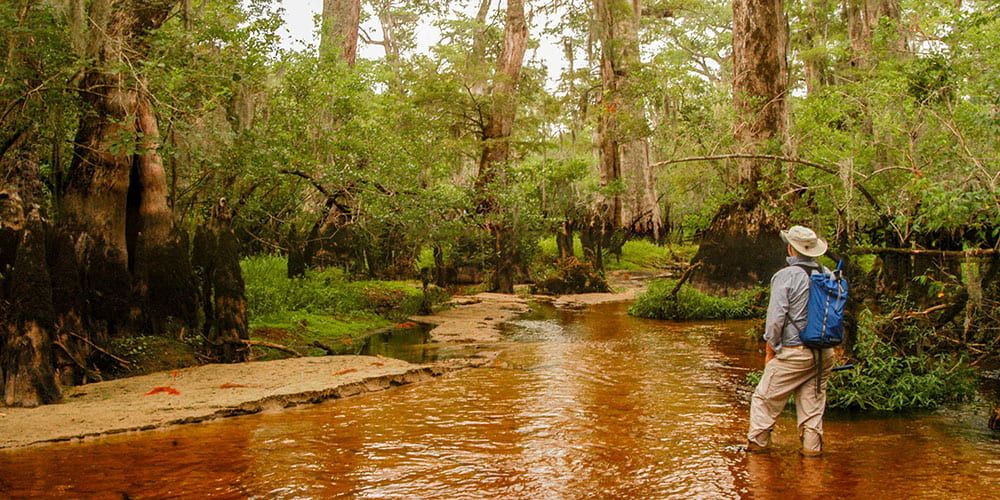
Researchers have identified a group of ancient bald cypress trees which are over 2,000 years old in the forested wetlands of North Carolina's Black River.
Staggeringly, the scientists found that one of the trees was 2,624 years old. This makes the bald cypress the oldest-known tree in the eastern portion of North America, as well as the longest-living known wetland tree species on Earth, according to a study published in the journal Environmental Research Communications.
The ancient group—consisting of perhaps 50 individuals—was discovered in 2017 by lead author of the study David Stahle from the University of Arkansas and his colleagues, who took 110 core samples measuring about 0.2 inches in diameter from various trees without harming them.
They then counted the annual growth rings to determine the age of the trees while also using radiocarbon dating on the innermost rings of the two oldest specimens for independent confirmation.
Stahle's prior research in the area had already identified bald cypress trees (Taxodium distichum) which were up to 1,700 years old, but the new data, taken from trees which had not been studied before, suggests the species is longer-lived than previously thought.
"We were not surprised to find these old trees because there are hundreds of 1,000-year-old trees throughout the Black River swamp forest and the oldest trees look old, real old," Stahle told Newsweek. "But we were gratified to finally prove the great age of bald cypress."
"The area of old growth bald cypress was 10 times larger than I realized," Stahle said in a statement. "We think there are older trees out there still."
The trees form part of an intact ecosystem of wetlands that extend along most of the 65-mile length of the Black River, which the researchers call one of the "great natural areas of eastern North America."
The river has been recognized as one of the cleanest and high quality waterways in North Carolina, and Stahle's work has helped boost preservation efforts in the area. In fact, The Nature Conservancy—a private land conservation group which keeps its holdings open to the public—has purchased around 6,400 hectares of this river ecosystem.
However, the researchers say that thousands more hectares of high quality ancient forests remain unprotected.
"It is exceedingly unusual to see an old-growth stand of trees along the whole length of a river like this," Stahle said. "Bald cypress are valuable for timber and they have been heavily logged. Way less than 1 percent of the original virgin bald cypress forests have survived."
Aside from their impressive age, the trees can also help to reconstruct ancient climate conditions in the region. This is because their growth is affected in different ways by both dry and wet conditions, and this shows up in the core samples.
In fact, the researchers say that the tree samples have provided the longest exactly-dated climate proxy—a source of climate information taken from natural material which can be used to estimate past conditions—in eastern North America, showing evidence of drought and flooding during pre-colonial times.
"The old bald cypress trees at Black River record the history of growing season precipitation for the mid-Atlantic region extending back into prehistory over 2,000 years," Stahle said. "The precipitation record in these trees is amazingly accurate and detailed."
"It includes the droughts recorded with rain gauges during the 20th and 21st centuries, and the severe multi-year droughts of 1587-1589 associated with the disappearance of the Lost Colony of Roanoke Island and the drought of 1606-1612 concurrent with the hardships suffered during the early years of the Jamestown Colony, the first successful English settlement in the New World," he said.
Katherine Skinner, executive director of The Nature Conservancy's North Carolina chapter, said in a statement that Dr. Stahle's original work on the Black River, which showed trees dating from Roman times, inspired her organization to begin conservation in the area more than two decades ago.
"This ancient forest gives us an idea of what much of North Carolina's coastal plain looked like millennia ago," she said. "It is a source of inspiration and an important ecosystem. Without Dr. Stahle, it would have gone unprotected and likely destroyed."
Living trees over 2,000-years-old are extremely rare worldwide, the researchers say. To date, only eight species have been proven to live for more than this amount of time—six of which are found in the western United States, one in Chile and, now, the bald cypress trees in North Carolina.
The team say that the cypress tree which they determined to be 2,624 years old, is one of the oldest known continuously living trees on the planet. Only individual trees of Sierra juniper (2,675 years old), giant sequoia (3,266 years old), alerce (3,622 years old) and Great Basin bristlecone pine (5,066 years old) have been demonstrated to live longer.
Nevertheless, the bald cypress tree is the oldest-known wetland tree. In second place is the Montezuma bald cypress (T. mucronatum,) found in Mexico, which can live for up to 1,500 years.
The researchers hope that the latest findings will boost conservation efforts in the area, which could help to mitigate some of the threats that the ancient wetland forest is facing.
"To counter these threats, the discovery of the oldest known living trees in eastern North America, which are in fact some of the oldest living trees on Earth, provides powerful incentive for private, state, and federal conservation of this remarkable waterway," the authors wrote in the study.
This article was updated to include additional comments from David Stahle.
Uncommon Knowledge
Newsweek is committed to challenging conventional wisdom and finding connections in the search for common ground.
Newsweek is committed to challenging conventional wisdom and finding connections in the search for common ground.
About the writer
Aristos is a Newsweek science reporter with the London, U.K., bureau. He reports on science and health topics, including; animal, ... Read more
To read how Newsweek uses AI as a newsroom tool, Click here.








